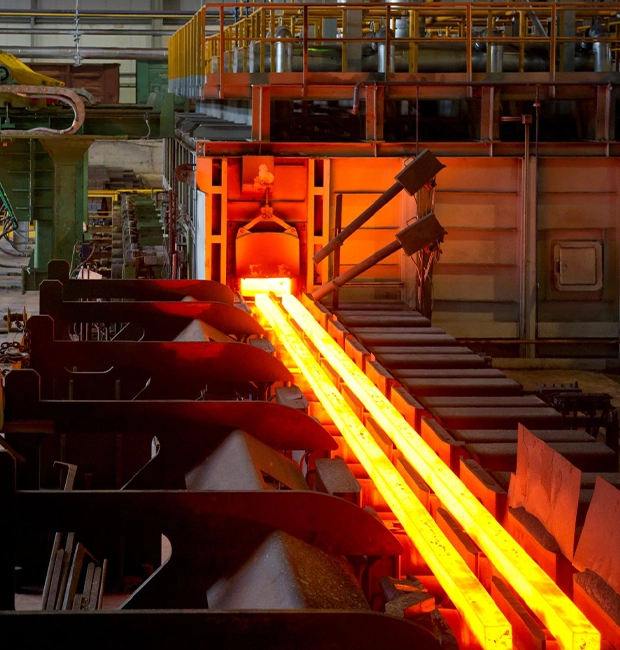
The hot strip mill is the heart of the steel industry, converting molten metal into flat, high-quality steel strips that are used for a wide range of applications, from automobiles to construction. At blistering temperatures, these mills shape steel with precision to meet the highest quality standards. Through its advanced automation solutions, such as AC drives, DC drives, PLC systems, and control panels, Fuji Gemco, a joint venture between Fuji Electric and Gemco Controls, is revolutionizing the hot strip mill industry. Fuji Gemco ensures that mills run efficiently, safely, and sustainably by providing world-class technology.
Hot strip mills process large steel slabs, heated to over 1,700°F (926°C), into thin, flat strips or coils. The process begins in a reheating furnace, where slabs are heated to the correct temperature. These slabs then pass through a series of rollers on roughing and finishing stands that reduce the thickness and refine the steel’s properties. The final product is coiled for use in the automotive, construction, and energy industries.
Automation is crucial in hot strip mills due to the complexity and scale of the process. Variables such as temperature, roller speed, and strip tension must be tightly controlled to ensure quality and prevent costly errors. Fuji Gemco’s automation systems make this possible, delivering precision and reliability at every step.

Steel slabs can be cut into strips or coils through continuous, high-speed operations, enabling the construction and automotive industries to meet their bulk requirements.
The hot rolling process enhances steel’s strength, ductility, and formability, making it suitable for demanding structural and industrial uses.
Advanced automation, such as Fuji Gemco’s Mill Tension Control and Loop Control, ensures uniform thickness and surface quality, thereby minimizing defects and waste.
The company produces a diverse range of strip thicknesses and widths for various applications, including thin sheets for appliances and heavy plates for infrastructure.
Large-scale, automated operations reduce per-unit production costs, making hot-strip mills economical for high-output manufacturing.
Automation is the engine behind modern hot strip mills, replacing manual adjustments with real-time control. Fuji Gemco’s solutions include AC drives, DC drives, PLC automation, and control panels that optimize every stage, from reheating to coiling. These systems ensure consistent quality, reduce energy use, and improve safety, making mills more competitive in a demanding market.
Automation transforms hot strip mills by addressing their complex needs. Here are five reasons why it’s essential:
Fuji Gemco combines Fuji Electric’s global expertise with Gemco Controls’ deep understanding of the Indian market to deliver tailored automation for hot strip mills. Their solutions are designed to handle the high temperatures, heavy loads, and precise requirements of these mills.
Core Technologies from Fuji Gemco
Fuji Gemco’s product lineup is built for reliability and performance. Here are seven core technologies they offer:
Fuji Gemco’s systems incorporate advanced features to address the challenges of hot strip mills. Here are nine ways their solutions matter:
Hot strip mills face significant challenges, from maintaining quality at high speeds to managing energy costs. Fuji Gemco’s automation systems address these issues, delivering measurable improvements in performance and efficiency.
Here are five challenges hot strip mills encounter:
Fuji Gemco’s systems tackle these challenges with precision and innovation. Here are seven solutions they provide:
The steel industry is evolving, driven by sustainability, efficiency, and digitalization.
Fuji Gemco is leading the charge by integrating next-generation technologies, such as IoT, AI, and machine learning,
into their automation systems, paving the way for smarter, greener hot strip mills.
Here are five trends to watch in hot strip mill automation:
Fuji Gemco is a trusted partner for hot strip mills, offering scalable, reliable, and customized automation solutions.
Their expertise, backed by Fuji Electric’s global innovation and Gemco Controls’ local insights, ensures mills achieve peak performance.
It refers to the automated control of operations like coiling, run-out tables, cooling, and finishing in strip mills to ensure consistent strip thickness and finish.
Key systems include coiler control, laminar cooling, shear synchronization, and tension regulation.
Fuji Gemco delivers end-to-end automation solutions using smart drives, PLC-SCADA systems, and real-time data control.
Automation ensures better dimensional accuracy, improved surface finish, higher output, and reduced downtime.
High-torque AC drives and precise DC drives are used for various stages like roughing, finishing, and coiling.
Proper tension control prevents strip breakage and waviness, ensuring quality and reducing rejection rates.
Challenges like mill synchronization, coil defects, and variable thickness are tackled using advanced automation tools.
Yes. SCADA systems provide complete visibility and control across all mill processes.
Absolutely. Retrofitting and modernizing old mills is one of Fuji Gemco’s core strengths.